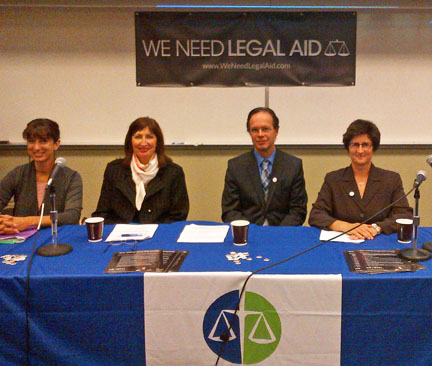There is an increase in the legalization of society, a Canadian Bar Association panel on legal aid heard yesterday. That increase means the need for lawyers across many areas that were once non-essential before have become vital now, noted criminal defence lawyer Richard Schwartz.

Legislation is vast and complex with serious distributive consequences outside of the particular proceeding for unrepresented litigants, he noted.
Schwartz was joined by West Coast Leaf’s Kasari Govender, Trish Kumpf, representing the aboriginal perspective, and Justice Susan Wishart to weigh in on the budgetary constraints plaguing legal aid at the CBA-BC-hosted A Day for Legal Aid event at the University of Victoria Sept. 26.
CBA-BC President Kerry Simons provided a short guide through the website www.weneedlegalaid.com where personal stories, news, and how to get involved in the “we need legal aid campaign” is detailed by the CBA.
The Canadian justice system has its hallmarks despite the tough government cutbacks it has recently faced. Wishart was the first to speak on the issue and commented: “Our legal system is envied around the world. . . legal aid is critical to allow all to participate in the justice system . . . real justice means fair access. We need legal aid so that everyone’s rights are protected.”
The panel all agreed legal aid is an essential service experiencing significant cutbacks, particular in family law, where unrepresented clients are suffering serious repercussions. The distributive consequences and costs to society created by legal problems are magnified when individuals go unrepresented.
Unfortunately, with so many other items of significance between Canadian politicians legal aid is often overlooked as a real issue. A Day for Legal Aid was established as a catalyst to change that attitude, because our revered justice system will not remain without appropriate public and government financial support.
A Day for Legal Aid engaged a breadth of legal stakeholders with the Dean of UVic law Donna Greschner, several local lawyers, former assistant deputy minister responsible for legal aid Jerry McHale, and a large representation of UVic students attending.
Ironically, the conference engaged many in the legal community engaged, but very few individuals from the general public were privy to it. Public engagement in a larger forum is the logical next step for A Day For Legal Aid, as it is the fundamental tool for political change.

 Legislation is vast and complex with serious distributive consequences outside of the particular proceeding for unrepresented litigants, he noted.
Legislation is vast and complex with serious distributive consequences outside of the particular proceeding for unrepresented litigants, he noted.